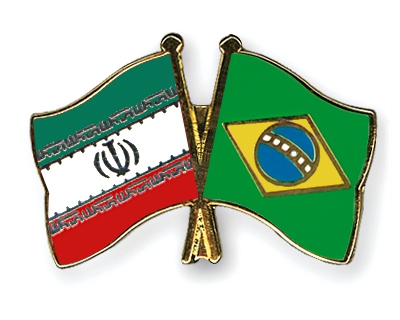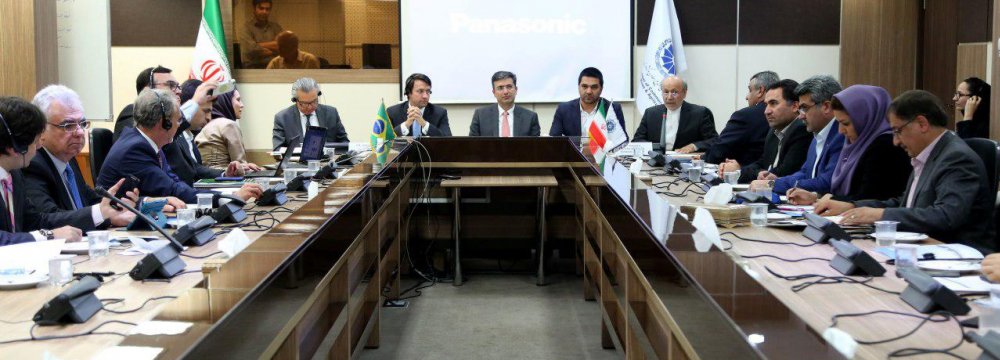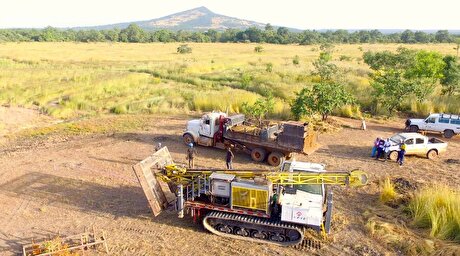
Removal of Banking Hurdles to Boost Iran-Brazil Trade Ties

These and other issues were discussed in a meeting attended by Brazilian Executive Secretary of the Ministry of Agriculture, Livestock and Supply Eumar Roberto Novacki and the officials of Iran Chamber of Commerce, Industries, Mines and Agriculture

During the meeting, the head of Iran-Brazil Chamber of Commerce said the biggest hurdle in the way of expanding ties between the two countries, especially in the agriculture sector, is banking problems, ICCIMA's official website reported.
"Iran and Brazil have high trade potentials, therefore the volume of our imports and exports could significantly increase if we manage to remove the banking hurdles," Kaveh Zargaran added.
Brazil's Ambassador to Iran, who also attended the meeting, noted that effective steps have been taken to improve banking ties between Iran and Brazil and a month ago, a banking delegation from the Central Bank of Iran visited Brazil to survey the banking and financial problems.
"A number of Iranian banks have signed cooperation agreements with Brazilian lenders, which has had promising results," Rodrigo de Azeredo Santos added.
The South American country's ambassador announced that Brazil's National Bank for Economic and Social Development has agreed to finance Iranian projects, if the Middle East country's banks guarantee the repayment of the allocated credits.
Santos believes that the plan might be realized by the end of 2017.
"Joint meetings between the two countries' business people are highly important, as they boost cooperation between the private sectors of Iran and Brazil, and also improve political ties," he said.
ICCIMA's deputy head, Pedram Soltani, said there is a big gap between Iran and Brazil's trade balance, as the volume of Iran's exports is significantly lower than imports.
"In the past few years, despite our nuclear sanctions, we met our agricultural needs from Brazil, therefore a mutual trust has been among both countries' merchants that they can continue their trade without worrying about political disputes but now we should try to also export more products to Brazil," he added.
Soltani noted that Iran and Brazil have always had friendly ties that have gotten stronger, especially in recent years.
"Brazil has one of the biggest economies with undeniable capabilities in various sectors and is one of the major partners of our traders," he said.
Brazil exported about $2.2 billion worth of commodities to Iran and imported commodities worth $75 million in return in the last Iranian year (ended March 20, 2017).
Iran's private sector has called on the government to consider allocating incentives, especially transportation subsidies in view of the long distance between the two countries, to Iranians exporting to Brazil in order to secure a foothold in South America’s biggest market.
Soltani further said Iran can benefit from Brazil's know-how in agriculture sector while both countries can engage in joint investment projects in the field.
"The fact that ICCIMA opened a joint chamber with Brazil before many of our neighboring countries proves the importance of this South American country for us," he said.
For developing business ties between the two countries, Iran-Brazil Chamber of Commerce was officially inaugurated on July 9. It is the first and only joint chamber with a South American country.
The executive secretary of the Brazilian Ministry of Agriculture, Livestock and Supply emphasized on his government's efforts to expand bilateral trade ties with Iran.
"The first Iran-Brazil Agriculture Council Meeting will be held on November 21-22 in Brazil and we invite Iranian private-sector companies along with the government sector to attend this meeting," he added.
Novacki noted that the meetings will help draw a roadmap for expansion of economic relations between Iran and Brazil.


Newmont nets $100M payment related Akyem mine sale

First Quantum scores $1B streaming deal with Royal Gold

Caterpillar sees US tariff hit of up to $1.5 billion this year

Copper price collapses by 20% as US excludes refined metal from tariffs

Gold price rebounds nearly 2% on US payrolls data

St Augustine PFS confirms ‘world-class’ potential of Kingking project with $4.2B value

B2Gold gets Mali nod to start underground mining at Fekola

Copper price posts second weekly drop after Trump’s tariff surprise

Goldman told clients to go long copper a day before price plunge

NextSource soars on Mitsubishi Chemical offtake deal

Copper price slips as unwinding of tariff trade boosts LME stockpiles

SAIL Bhilai Steel relies on Danieli proprietary technology to expand plate mill portfolio to higher steel grades

Alba Discloses its Financial Results for the Second Quarter and H1 of 2025

Australia weighs price floor for critical minerals, boosting rare earth miners

Australia pledges $87M to rescue Trafigura’s Nyrstar smelters in critical minerals push

Fresnillo lifts gold forecast on strong first-half surge

Why did copper escape US tariffs when aluminum did not?

Fortuna rises on improved resource estimate for Senegal gold project

Caterpillar sees US tariff hit of up to $1.5 billion this year

NextSource soars on Mitsubishi Chemical offtake deal

Copper price slips as unwinding of tariff trade boosts LME stockpiles

SAIL Bhilai Steel relies on Danieli proprietary technology to expand plate mill portfolio to higher steel grades

Alba Discloses its Financial Results for the Second Quarter and H1 of 2025

Australia weighs price floor for critical minerals, boosting rare earth miners

Australia pledges $87M to rescue Trafigura’s Nyrstar smelters in critical minerals push

Fresnillo lifts gold forecast on strong first-half surge

Why did copper escape US tariffs when aluminum did not?

Fortuna rises on improved resource estimate for Senegal gold project














